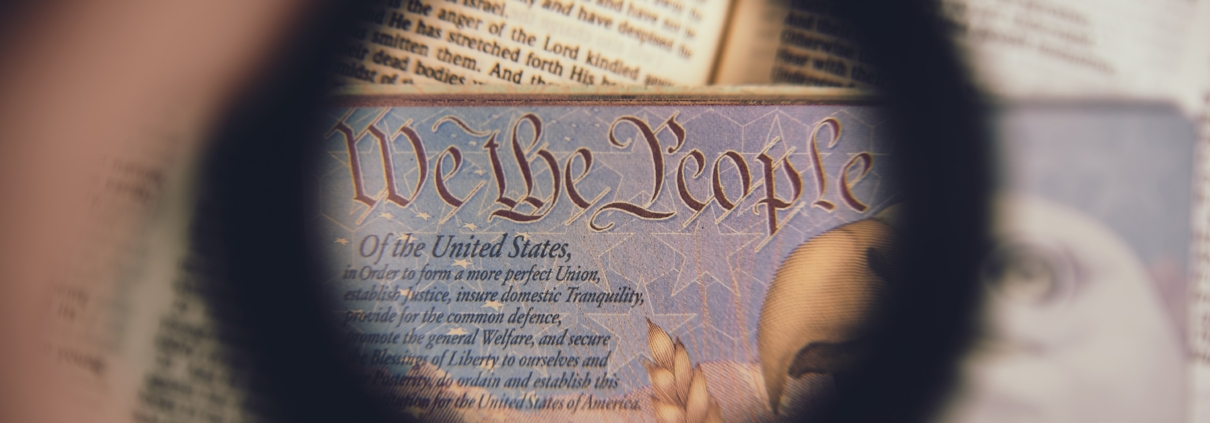A citizen’s perception of police influences their perception of Constitutional rights
By Jesse Williams & Randy Larcher | Originally Posted on Calibre Press, Sep 20, 2018
“We few, we happy few, we band of brothers; For he today that sheds his blood with me, shall be my brother…”
Shakespeare’s Henry V, Act IV
Human history is a repeated dialogue of division. From the earliest times, humans have divided themselves into groups and then competed with other groups for territory, resources, or other priorities. Examples of this propensity abound, from The Crusades to the religious, ethnic, and gang wars of our current day. Group identity has an extremely powerful influence on behavior.
Fictional works and the “better angels of our nature” inspire higher ideals. From the Montagues and the Capulets of Romeo and Juliet to the Civil Rights Movement, we observe that these kinds of divisions can be overcome, if only slowly and through much pain and suffering. One of the reasons we love reconciliation stories so much is that they show a higher way of living. As humans give up temporary and mostly superficial bonds in exchange for higher and more meaningful ones, a better existence follows.
So, what does this have to do with policing?
Divisions
There are approximately 765,000 sworn law enforcement officers in the United States. Based on the most recent U.S. Census estimate of 327 million people in this country, this means we represent a mere .2% of the population. We are indeed few. For every 425 inhabitants, there is one lone police officer.
Despite our relative size compared to the rest of the population, we receive a large share of the media’s, and by extension, the general public’s, attention. Just about everyone has a story about an interaction with a police officer. This disparity in population size versus public exposure is one cause of our closing ranks. Our fraternity is a positive and necessary thing.
The brotherhood and sisterhood in policing is exceptional, and it’s beneficial for many reasons. We have common goals and objectives. We share best practices and a collective will to serve and protect. We should indeed be a happy few, a band of brothers and sisters. This profession is not for everyone, and the high standards and stresses of the job determine that relatively few are qualified for or desire to do it. These factors and many others lead to the fraternal nature of the profession. There is a sense of camaraderie and teamwork, and this is essential to getting the job done.
We are a family. Like any other family, we have our challenges and sometimes behave poorly towards each other. We argue about territory, responsibilities, and who is going to do the unsavory work. Sometimes we pass along more than our fair share of blame and take more than our fair share of credit. But at the end of the day, we are there for each other.
However, there are hidden dangers associated with active membership in our fraternity. Scientists have learned that once human beings identify themselves as part of a group, they tend to act in ways beneficial to the group and to the detriment of an opposing (or simply different) group. As this behavior becomes habitual, an implicit or even overt “us vs. them” mentality can set in and become the norm. In our current political landscape, we often see a narrative that pits the public against the police and the police against the public, encouraging an even deeper allegiance to our profession.
Sir Robert Peel, the father of modern policing, understood this challenge. His antidote was to drive home in the minds of the citizenry the idea that the police are the public and the public are the police. They are one and the same. We must always be aware of how our group identities (especially when we are on the job) influence our behavior towards other groups. When we assumed the mantle of being police officers, we took an oath to uphold and defend the Constitution. The Constitution assures that all citizens will be treated with equal protection under the law, without any regard to which group they belong. All will have a right to due process. All will have a right to procedural justice, supported by fair, and impartial policing.
Constitutional Obligations
Never forget that a person’s perception of how the Constitution operates is directly related to his or her experiences with the police. We are the personification of the rights guaranteed by the Constitution. We are the Constitution in action. We make the Constitution come to life for the people it promises to protect.
We are human beings acting under a standard that demands unbiased action on the part of its executors. This is a daunting proposition, but we must seek each day to come as close to the standard as possible.
We heard a story recently about an agency that was working to improve officer conduct and community relations. Some consultants were brought in, and it was suggested that at the beginning of each shift the officers would stand and recite their oath of office. As the officers continued this practice over time, a distinctive shift in behavior was observed. Perhaps it sounds a little cheesy at first, but there is a certain gravity and sense of noble purpose that comes along with remembering that oath. When was the last time you looked at your oath of office? We challenge you to find a way to make your oath of office a more consistent part of your daily routine in doing this incredible job of policing.
Conclusion
It is great to be a part of this unique fraternity, but we should never forget we do have a higher loyalty. We didn’t take an oath to arrest a certain number of people or write a certain number of tickets, but we did take an oath to support and defend the Constitution of the United States. The Constitution is our ultimate performance standard. We must be aware of how our behavior towards others may be shaped by the comparison of their “group” to our thin blue line. We must guard against the “us vs. them” mindset and always strive to bring to life the Constitution in the way it was intended. It’s what we signed up for, and no one else is going to do it for us.



